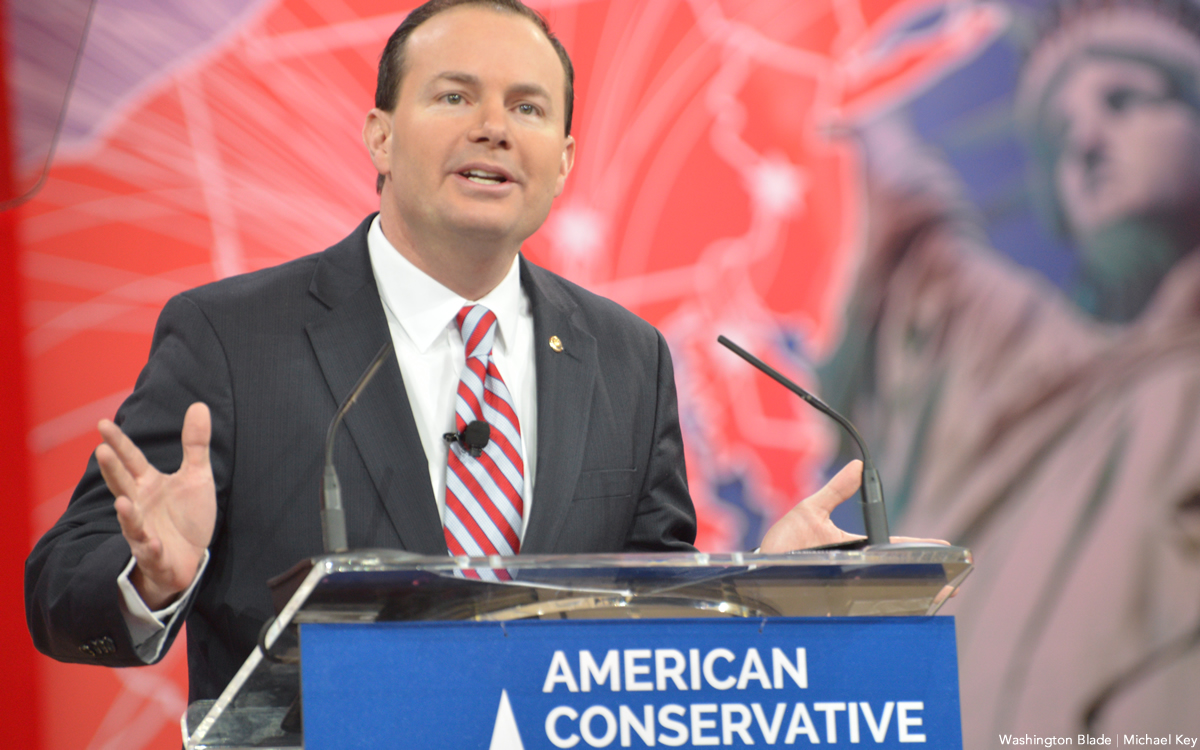Politics
Amendment to weaken Respect for Marriage Act targets D.C.
Norton calls measure by Utah Sen. Lee ‘attack’ on LGBTQ residents

D.C. congressional Delegate Eleanor Holmes Norton released a statement on Thursday disclosing that an amendment introduced by U.S. Sen. Mike Lee (R-Utah) to weaken the Respect for Marriage Act includes little-noticed language that would prohibit D.C. from enforcing laws protecting same-sex couples from discrimination.
Norton’s statement came one day after 12 GOP senators joined all 50 Democratic senators to approve a procedural motion known as cloture to block a filibuster and allow the Respect for Marriage Act to come up for a full Senate vote.
The act, which was passed by the House of Representatives earlier this year, would enshrine marriage equality into federal law, preventing states from banning same-sex marriage if the U.S. Supreme Court reverses its historic 2015 Obergefell decision legalizing same-sex marriage in all 50 states.
Lee, who is among the Republican senators who opposes the Respect for Marriage Act, introduced his amendment on Nov. 16 shortly before the cloture motion was approved by a 62 to 37 vote. He was expected to introduce it again at the time the Respect for Marriage Act came up for a final vote on the Senate floor, which Capitol Hill observers say could take place this week.
Norton said she has called on the Senate to reject the Lee amendment. A spokesperson for Sen. Tammy Baldwin (D-Wisc.), one of the lead sponsors of the Respect for Marriage Act, said no action was taken on the amendment on Wednesday, Nov. 16, and it was expected to receive little or no support if Lee were to introduce it again.
“Specifically, the amendment would prohibit D.C. from taking certain adverse actions, such as denying grants or contracts, against individuals and entities that otherwise unlawfully discriminate against same-sex couples if such individuals or entities have a sincerely held religious belief or moral conviction that marriage is a union of individuals of the opposite sex,” Norton said in her statement.
“While the amendment is framed as prohibiting the federal government from taking adverse action for violations of federal law, it defines the term federal government and federal law to include the D.C. government and D.C. law, respectively,” Norton said.
“This amendment is an attack on all LGBTQ+ Americans, but it also uniquely attacks D.C.’s LGBTQ+ residents,” said Norton in her statement. “Senator Mike Lee, who professes to support local control of local affairs, regularly tries to use Congress’ undemocratic power over D.C. to interfere in D.C.’s local affairs,” she said. “I have defeated all his prior attempts to interfere in D.C.’s local affairs, and I will defeat this one, too.”
In his own statement released on Nov. 16, Lee says the religious protections added to the Respect for Marriage Act as a bipartisan compromise among Senate Democrats and several key Republican senators, including Mitt Romney (R-Utah) and Susan Collins (R-Maine), were “severely anemic and largely illusory.”
Lee said in his statement that supporters of the bill were misleading the public by claiming it would merely codify in federal law the Obergefell Supreme Court ruling.
“Religious Americans will be subject to potentially ruinous litigation, while the tax-exempt status of certain charitable organizations, educational institutions, and non-profits will be threatened,” his statement says. “My amendment would have shored up these vulnerabilities. It is a shame it wasn’t included,” he said, referring to lack of support for a vote to take it up on Nov. 16.
Eli Rosen, a spokesperson for Baldwin, told the Blade on Thursday that a bipartisan coalition of both Democratic and Republican senators as well as religious leaders strongly dispute Lee’s claim that the current Senate version of the Respect for Marriage Act will be harmful to religious organizations.
Rosen points out that religious universities and the Mormon Church are part of the coalition that supports the Senate’s changed version of the act, which was expected to be voted on Thursday or possibly shortly after the Thanksgiving holiday if the vote doesn’t take place this week. He noted that upon approval by the Senate, the measure would go back to the House, which was expected to approve the changes made to the House bill through the Senate compromise language.
Politics
After Biden signs TikTok ban its CEO vows federal court battle
“Rest assured, we aren’t going anywhere,” CEO said

President Joe Biden signed an appropriations bill into law on Wednesday that provides multi-billion dollar funding and military aid for Ukraine, Israel, and Taiwan after months of delay and Congressional infighting.
A separate bill Biden signed within the aid package contained a bipartisan provision that will ban the popular social media app TikTok from the United States if its Chinese parent company ByteDance does not sell off the American subsidiary.
Reacting, TikTok CEO Shou Zi Chew said Wednesday that the Culver City, Calif.-based company would go to court to try to remain online in the U.S.
In a video posted on the company’s social media accounts, Chew denounced the potential ban: “Make no mistake, this is a ban, a ban of TikTok and a ban on you and your voice,” Chew said. “Rest assured, we aren’t going anywhere. We are confident and we will keep fighting for your rights in the courts. The facts and the constitution are on our side, and we expect to prevail,” he added.
Our response to the TikTok Ban Bill in the US: https://t.co/LpoE67sxHo
— TikTokComms (@TikTokComms) April 24, 2024
White House Press Secretary Karine Jean-Pierre adamantly denied during a press briefing on Wednesday that the bill constitutes a ban, reiterating the administration’s hope that TikTok will be purchased by a third-party buyer and referencing media reports about the many firms that are interested.
Chew has repeatedly testified in both the House and Senate regarding ByteDance’s ability to mine personal data of its 170 million plus American subscribers, maintaining that user data is secure and not shared with either ByteDance nor agencies of the Chinese government. The testimony failed to assuage lawmakers’ doubts.
In an email, the former chair of the House Intelligence Committee, U.S. Rep. Adam Schiff (D-Calif.), who doesn’t support a blanket ban of the app, told the Washington Blade:
“As the former chairman of the House Intelligence Committee, I have long worked to safeguard Americans’ freedoms and security both at home and abroad. The Chinese Communist Party’s ability to exploit private user data and to manipulate public opinion through TikTok present serious national security concerns. For that reason, I believe that divestiture presents the best option to preserve access to the platform, while ameliorating these risks. I do not support a ban on TikTok while there are other less restrictive means available, and this legislation will give the administration the leverage and authority to require divestiture.”
A spokesperson for U.S. Sen. Alex Padilla (D-Calif.) told the Blade: “Senator Padilla believes we can support speech and creativity while also protecting data privacy and security. TikTok’s relationship to the Chinese Communist Party poses significant data privacy concerns. He will continue working with the Biden-Harris administration and his colleagues in Congress to safeguard Americans’ data privacy and foster continued innovation.”
The law, which gives ByteDance 270 days to divest TikTok’s U.S. assets, expires with a January 19, 2025 deadline for a sale. The date is one day before Biden’s term is set to expire, although he could extend the deadline by three months if he determines ByteDance is making progress or the transaction faces uncertainty in a federal court.
Former President Donald Trump’s executive order in 2020, which sought to ban TikTok and Chinese-owned WeChat, a unit of Beijing-based Tencent, in the U.S., was blocked by federal courts.
TikTok has previously fought efforts to ban its widely popular app by the state of Montana last year, in a case that saw a federal judge in Helena block that state ban, citing free-speech grounds.
The South China Morning Post reported this week that the four-year battle over TikTok is a significant front in a war over the internet and technology between Washington and Beijing. Last week, Apple said China had ordered it to remove Meta Platforms’s WhatsApp and Threads from its App Store in China over Chinese national security concerns.
A spokesperson for the ACLU told the Blade in a statement that “banning or requiring divestiture of TikTok would set an alarming global precedent for excessive government control over social media platforms.”
LGBTQ TikToker users are alarmed, fearing that a ban will represent the disruption of networks of support and activism. However, queer social media influencers who operate on multiple platforms expressed some doubts as to long term impact.
Los Angeles Blade contributor Chris Stanley told the Blade:
“It might affect us slightly, because TikTok is so easy to go viral on. Which obviously means more brand deals, etc. However they also suppress and shadow ban LGBTQ creators frequently. But we will definitely be focusing our energy more on other platforms with this uncertainty going forward. Lucky for us, we aren’t one trick ponies and have multiple other platforms built.”
Brooklyn, N.Y.,-based gay social media creator and influencer Artem Bezrukavenko told the Blade:
“For smart creators it won’t because they have multiple platforms. For people who put all their livelihood yes. Like people who do livestreams,” he said adding: “Personally I’m happy it gets banned or American company will own it so they will be less homophobic to us.”
TikTok’s LGBTQ following has generally positive experiences although there have been widely reported instances of users, notably transgender users, seemingly targeted by the platform’s algorithms and having their accounts banned or repeatedly suspended.
Of greater concern is the staggering rise in anti-LGBTQ violence and threats on the platform prompting LGBTQ advocacy group GLAAD, in its annual Social Media Safety Index, to give TikTok a failing score on LGBTQ safety.
Additional reporting by Christopher Kane
Politics
Smithsonian staff concerned about future of LGBTQ programming amid GOP scrutiny
Secretary Lonnie Bunch says ‘LGBTQ+ content is welcome’

Staff at the Smithsonian Institution are concerned about the future of LGBTQ programming as several events featuring a drag performer were cancelled or postponed following scrutiny by House Republicans, according to emails reviewed by the Washington Post.
In December, Secretary Lonnie G. Bunch III appeared before a hearing led by GOP members of the Committee on House Administration, who flagged concerns about the Smithsonian’s involvement in “the Left’s indoctrination of our children.”
Under questioning from U.S. Rep. Stephanie Bice (R-Okla.), Bunch said he was “surprised” to learn the Smithsonian had hosted six drag events over the past three years, telling the lawmakers “It’s not appropriate to expose children” to these performances.
Collaborations with drag artist Pattie Gonia in December, January, and March were subsequently postponed or cancelled, the Post reported on Saturday, adding that a Smithsonian spokesperson blamed “budgetary constraints and other resource issues” and the museums are still developing programming for Pride month in June.
“I, along with all senior leaders, take seriously the concerns expressed by staff and will continue to do so,” Bunch said in a statement to the paper. “As we have reiterated, LGBTQ+ content is welcome at the Smithsonian.”
The secretary sent an email on Friday expressing plans to meet with leaders of the Smithsonian Pride Alliance, one of the two groups that detailed their concerns to him following December’s hearing.
Bunch told the Pride Alliance in January that with his response to Bice’s question, his intention was to “immediately stress that the Smithsonian does not expose children to inappropriate content.”
“A hearing setting does not give you ample time to expand,” he said, adding that with more time he would have spoken “more broadly about the merits and goals of our programming and content development and how we equip parents to make choices about what content their children experience.”
Politics
Survey finds support for Biden among LGBTQ adults persists despite misgivings
Data for Progress previewed the results exclusively with the Blade

A new survey by Data for Progress found LGBTQ adults overwhelmingly favor President Joe Biden and Democrats over his 2024 rival former President Donald Trump and Republicans, but responses to other questions may signal potential headwinds for Biden’s reelection campaign.
The organization shared the findings of its poll, which included 873 respondents from across the country including an oversample of transgender adults, exclusively with the Washington Blade on Thursday.
Despite the clear margin of support for the president, with only 22 percent of respondents reporting that they have a very favorable or somewhat favorable opinion of Trump, answers were more mixed when it came to assessments of Biden’s performance over the past four years and his party’s record of protecting queer and trans Americans.
Forty-five percent of respondents said the Biden-Harris administration has performed better than they expected, while 47 percent said the administration’s record has been worse than they anticipated. A greater margin of trans adults in the survey — 52 vs. 37 percent — said their expectations were not met.
Seventy precent of all LGBTQ respondents and 81 percent of those who identify as trans said the Democratic Party should be doing more for queer and trans folks, while just 24 percent of all survey participants and 17 percent of trans participants agreed the party is already doing enough.
With respect to the issues respondents care about the most when deciding between the candidates on their ballots, LGBTQ issues were second only to the economy, eclipsing other considerations like abortion and threats to democracy.
These answers may reflect heightened fear and anxiety among LGBTQ adults as a consequence of the dramatic uptick over the past few years in rhetorical, legislative, and violent bias-motivated attacks against the community, especially targeting queer and trans folks.
The survey found that while LGBTQ adults are highly motivated to vote in November, there are signs of ennui. For example, enthusiasm was substantially lower among those aged 18 to 24 and 25 to 39 compared with adults 40 and older. And a plurality of younger LGBTQ respondents said they believe that neither of the country’s two major political parties care about them.
-

 District of Columbia3 days ago
District of Columbia3 days agoCatching up with the asexuals and aromantics of D.C.
-

 State Department5 days ago
State Department5 days agoState Department releases annual human rights report
-

 South America3 days ago
South America3 days agoArgentina government dismisses transgender public sector employees
-

 Maine4 days ago
Maine4 days agoMaine governor signs transgender, abortion sanctuary bill into law












